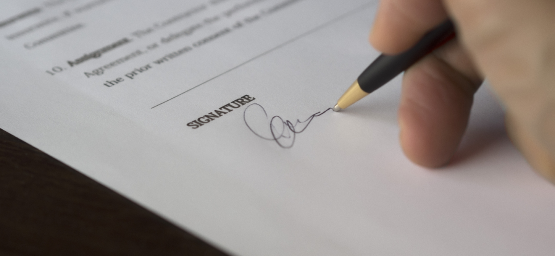Contracts
“Get it in writing.”
A contract is a written agreement between two parties that details the terms of a transaction.
Having a written contract means that everyone knows what he is supposed to do and when, and makes it easier to resolve any disputes that might arise.
No matter what type of business you’re in, a handshake just won’t cut it anymore. Having any agreements written down and signed is crucial to effectively manage your business. Despite your best efforts, things can still go wrong. Relationships go downhill. Conditions and minds change.
People lie. When these things happen, and they will happen, contracts are the number one tool you can use to prevent any disputes up front. Don’t take a chance on a handshake, contact a LawVo contract specialist to draft or review a contract to ensure you are legally protected.

Why should you get it in writing?
Contracts protect both you and your client.
One of the most basic building blocks of good business is having a valid and concrete contract. Contracts, by nature, are meant to be a safeguard for both parties of the business agreement.
When you and your client agree upon the terms of a contract and sign, you’re taking the pre-emptive step to squash any potential disagreements. If things go south, your contract gives you the ability to enforce those terms.

Contracts prevent misunderstandings.
When your agreement has been hashed out between both parties, write it all down. Having clear and concise terms that both you and your client agree to will help shape the expectations and guide the performance of your duties.
Your contract ensures that both parties understand what the expectation is and what either of you will be receiving during and at the end of your working relationship. With everything written down, it’s easy to go back and refer to the contract when there’s a hiccup in your working relationship or a question about your agreed-upon service.

Contracts specify what rights the client is purchasing and what rights you retain.
When you take a photo, you own the rights to sell copies of that image as well as display the image publicly (amongst many other rights). Some clients may be unaware or uncomfortable with this, so your contract should be explicit and state exactly what rights you will retain in regards to those images and what rights your client will have to them.

Contracts stipulate the payment process.
Having a signed contract means that you and your client have agreed ahead of time how and when you’ll be paid, and what happens when they stiff you at the end of the road.

Contracts are legally binding.
Once your contract has been signed, both you and your client are held to certain terms that have been agreed upon beforehand. If you are found in any way to be in violation of these terms, your client can take legal action against you, and vice versa if your client is in violation of your contract. Your contract is the safety net you get to rely on if negative scenarios happen to crop up.
This is the piece of paper you get to wave in court to prove that you’ve agreed to terms and they’re not happening so you’re due recompense. Any client that refuses to sign a contract is one to be avoided at all costs. If you agree to do the work without some sort of written agreement, be that a formal contract or email interactions, prepare yourself for a major headache down the line.
